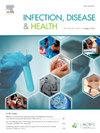Religious influences on infection prevention and control practices in healthcare settings: A scoping review
IF 2
Q2 PUBLIC, ENVIRONMENTAL & OCCUPATIONAL HEALTH
引用次数: 0
Abstract
Background
Healthcare-associated infections pose a significant global health challenge. While evidence-based infection prevention and control (IPC) interventions are widely implemented, their implementation may be influenced by religious factors. This scoping review aimed to examine the religious factors that influence IPC practices among healthcare providers.
Method
A systematic search was conducted in CINAHL, Emcare, Scopus, and Web of Science databases. Given the anticipated paucity of literature, there were no date limiters. Articles demonstrating a direct relationship between religion and IPC practices in healthcare settings were included. Data extraction and quality appraisal were performed independently by multiple researchers.
Results
Thirteen articles met the inclusion criteria. Three main themes emerged: 1) religious rituals and influence, 2) use of alcohol, and 3) “bare below the elbows” principle. Religious practices were found to act as both enablers and barriers to IPC compliance. The use of alcohol-based hand rubs presented challenges for some religious groups, while religious dress codes conflicted with the “bare below the elbows” principle.
Conclusion
This review highlights the complex interplay between religion and IPC practices. Findings suggest the need for culturally sensitive IPC strategies that respect religious beliefs while maintaining effective IPC measures. Further research is needed to develop inclusive policies and educational programs that address these religious factors in healthcare settings.
宗教对卫生保健机构感染预防和控制实践的影响:范围审查。
背景:医疗保健相关感染是一个重大的全球健康挑战。虽然基于证据的感染预防和控制干预措施得到了广泛实施,但其实施可能受到宗教因素的影响。本综述旨在研究影响医疗保健提供者IPC实践的宗教因素。方法:系统检索CINAHL、Emcare、Scopus、Web of Science数据库。考虑到预期文献的缺乏,没有日期限制。文章表明,在卫生保健环境中,宗教与IPC实践之间存在直接关系。数据提取和质量评估由多位研究人员独立完成。结果:13篇文章符合纳入标准。出现了三个主要主题:1)宗教仪式和影响,2)酒精的使用,以及3)“裸露在肘部以下”原则。研究发现,宗教习俗对遵守IPC既有促进作用,也有阻碍作用。对一些宗教团体来说,使用含酒精的洗手液是一种挑战,而宗教的着装规范与“肘部以下裸露”的原则相冲突。结论:本综述强调了宗教与IPC实践之间复杂的相互作用。研究结果表明,需要制定具有文化敏感性的IPC策略,在尊重宗教信仰的同时保持有效的IPC措施。需要进一步的研究来制定包容性的政策和教育计划,以解决医疗保健环境中的这些宗教因素。
本文章由计算机程序翻译,如有差异,请以英文原文为准。
求助全文
约1分钟内获得全文
求助全文
来源期刊

Infection Disease & Health
PUBLIC, ENVIRONMENTAL & OCCUPATIONAL HEALTH-
CiteScore
5.70
自引率
5.70%
发文量
40
审稿时长
20 days
期刊介绍:
The journal aims to be a platform for the publication and dissemination of knowledge in the area of infection and disease causing infection in humans. The journal is quarterly and publishes research, reviews, concise communications, commentary and other articles concerned with infection and disease affecting the health of an individual, organisation or population. The original and important articles in the journal investigate, report or discuss infection prevention and control; clinical, social, epidemiological or public health aspects of infectious disease; policy and planning for the control of infections; zoonoses; and vaccination related to disease in human health. Infection, Disease & Health provides a platform for the publication and dissemination of original knowledge at the nexus of the areas infection, Disease and health in a One Health context. One Health recognizes that the health of people is connected to the health of animals and the environment. One Health encourages and advances the collaborative efforts of multiple disciplines-working locally, nationally, and globally-to achieve the best health for people, animals, and our environment. This approach is fundamental because 6 out of every 10 infectious diseases in humans are zoonotic, or spread from animals. We would be expected to report or discuss infection prevention and control; clinical, social, epidemiological or public health aspects of infectious disease; policy and planning for the control of infections; zoonosis; and vaccination related to disease in human health. The Journal seeks to bring together knowledge from all specialties involved in infection research and clinical practice, and present the best work in this ever-changing field. The audience of the journal includes researchers, clinicians, health workers and public policy professionals concerned with infection, disease and health.
 求助内容:
求助内容: 应助结果提醒方式:
应助结果提醒方式:


